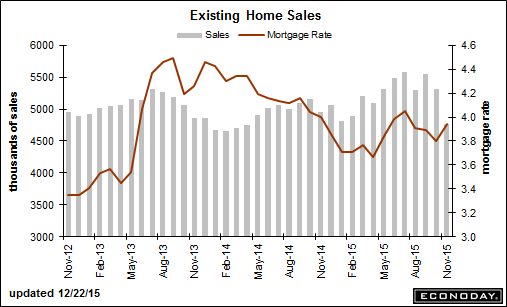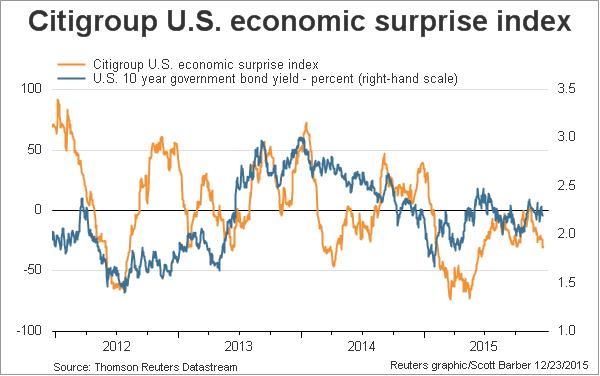U.S. economy ending year with a whimper
U.S. stock markets have surged this week amid a holiday-shortened week for financial markets and tepid trading volumes, putting the S&P 500 back back into the green for the year.
Investors seem to have shrugged off a range of concerns, including the potential fallout from the first interest rate hike in nearly a decade, weakness in the bond market and falling corporate profitability. A rebound in energy prices, driven by a tax-driven decrease in oil inventories heading into the end of the year -- has fueled much of the gain in stocks, which has pushed the Dow Jones industrial average up nearly 450 points, or 2.6 percent, in three days.
But stepping back, recent economic data suggests the enthusiasm could be premature. The U.S. economy seems to be slowing just as the Federal Reserve tightens monetary policy. If the trend continues, stocks could weak as the calendar flips into 2016.
On Wednesday, ongoing weakness in manufacturing underscored a 0.4 percent drop in core capital goods orders in November. Core capital shipments were down 0.5 percent. This was well below expectations, with research firm Capital Economics forecasting 2 percent annualized growth in the final three months of the year.
In another sign of economic softness, the National Association of Realtors on Tuesday showed existing home sales coming in at a seasonally-adjusted annual rate of 4.76 million in November, a 10.5 percent drop from October and below the 5.40 million consensus estimate. This was the weakest result in 19 months. The trade group attributed the decline to a sparse inventory of available homes and rising prices, which is taking residential real estate beyond the means of many house-hunters.
Last week, U.S. industrial production dropped 0.6 percent in November, the biggest month-over-month decline since 2012. While mild weather is playing a role, lessening the demand on utilities, readings were soft overall, reflecting a slowdown in global demand for U.S. products as a result of the dollar's recent strength.
The result of the loss of momentum has been a fresh decline in the Citigroup Economic Surprise Index, which tracks actual economic data relative to expectations. When the data is better than analysts are estimating, the line rises; when results are weaker than forecast, the line falls. As shown in the chart above, the index (in yellow) is threatening to fall below its summertime lows and return to the late 2014 performance that was blamed at the time on severe winter weather.
Financial markets are likely to grow increasingly concerned that the Fed's more aggressive rate hike forecast for 2016 -- the central bank expects four 0.25 percent hikes, while stock futures are pricing in between two and three hikes -- could result in further economic weakness.
This is the message of the Atlanta Federal Reserve Bank's GDPNow real-time tracking estimate of fourth-quarter GDP growth. The tool shows that economic growth for the period has fallen to a low of 1.3 percent, with consumer spending expected to be modest this holiday shopping season.


